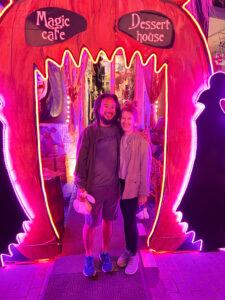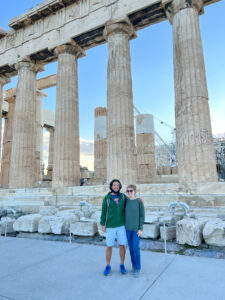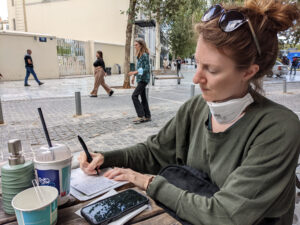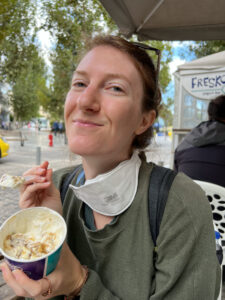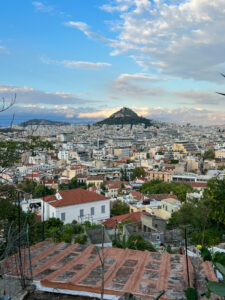
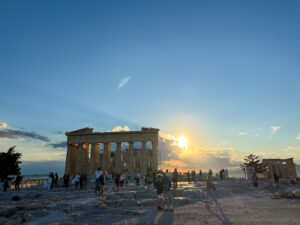
We all have a picture of Greece in our minds from some long-ago history lesson that stuck. For me, that history lesson came from Mrs. Spiers in 2nd grade. Mrs. Spiers was my gifted teacher from 2nd through 6th grade, and her class was largely the reason I stopped sobbing inconsolably when it was time to get out of the car for school each morning. (Her class was also one of the reasons I started speaking audible words while at school and did not remain so socially anxious as to be mute until I graduated.)
Greek mythology was one of our first units in 2nd grade. We met twice a week in a tiny room that might have normally been used for storage behind the gym because the school hadn’t given us our own regular classroom yet. I remember Mrs. Spiers bringing us baklava and telling us it was a Greek pastry, and I thought I was surely the most worldly and cultured person on Earth for experiencing something so exotic. We learned about Ancient Greece, the gods, Athens, Mount Olympus, and the different styles of columns. And it was then that an image of Greece was embedded in my mind where it would prod incessantly at me for the next 25 years demanding that I go see it for myself. (Over the next 5 years, Mrs. Spiers also taught me about Ancient Egypt, the Middle Ages, Australia, insects, reptiles, Blooms Taxonomy, and how to write a check. She was the first person other than my parents who ever told me I could be a writer. She’s retiring this year, and I can’t even imagine how many kids she inspired between when I was in 2nd grade and now.)

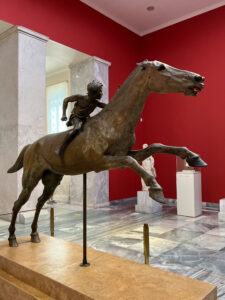
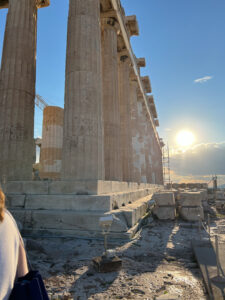

When I imagined mainland Greece before visiting, I pictured an amalgamation of every photo I’ve seen of Athens, all glowing marble and mystery. And of course, social media influencers show us daily that the Greek islands have perpetually perfect weather, no tourists whatsoever, and magical beaches that will make us look collectively tan and flawless in our swimsuits. I did a lot of research over the past few years to decide where to go in Greece but also to help me reshape my expectations. I was surprised by what I found from other tourists and bloggers. Mainland Greece, to most people, means Athens, and at least half of what I read about Athens was negative. Some people said it was trashy and ugly. Some said they found certain areas to be dangerous. Some people said the ruins were a letdown. Some people said the ongoing economic crisis in Greece had ruined things. Basically, a lot of people expressed that it just didn’t live up to their expectations. I couldn’t help but wonder—how could we possibly expect it to live up to ANY of our expectations? I prepared myself to appreciate the history without needing to love the city. I wouldn’t let myself be disappointed.
But before heading to Athens, we stopped in Thessaloniki. It was a logistical stop more than anything else. It was a 5-hour bus ride from Sofia, and then a 4-hour train ride the rest of the way to Athens, so I decided we’d spend a night to break it up. It was a chance to see Greece’s “second city,” whose lack of tourism has helped it maintain its authenticity. On the bus, we crossed the border into Greece which meant I was briefly dipping back into the Schengen Zone for the first time in over a month. For US citizens, there’s a strict rule that you can’t stay in the Schengen Zone for more than 90 days in a 180-day period without a special visa. The border patrol officer examined my passport for a long time, trying to make sense of the randomly scattered passport stamps. I realized then that I’d been in Europe for long enough that border patrol officers were going to start looking harder to make sure I was in compliance with the rules. I made a list of entry and exit dates to give them in the future, and I stood close to Michael so that when officers asked where all he’d been and what dates, he could point to me and say, “Wherever she brought me. She can tell you.”
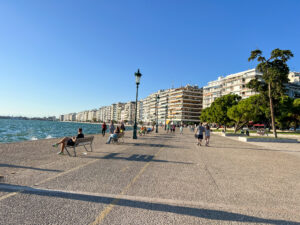
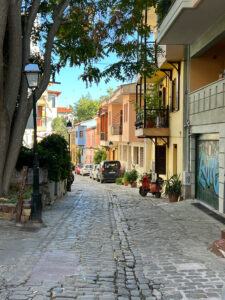
Thessaloniki was not at all what I expected. The history there was both fascinating and sad. I took a walking tour and assumed I’d learn about classical Greece, but instead I learned about how this was a city with a 70% Jewish population until WWII. After the city was occupied by German forces in 1941, the Jewish community was destroyed, and half a million Jews were sent to Auschwitz. Only about 1,200 Jewish people live there today. It feels entirely separate from the Greece I’d imagined, but you can see Mount Olympus from downtown.
We ended up spending an extra night in Thessaloniki eating some of the best food I had in Greece. The first restaurant we visited had an entirely hand-written menu and gave me a giant pan of hot olives. For lunch the next day, I had some of the best risotto of my life. I spent half a day visiting pharmacies looking for lactose enzyme pills so that I didn’t have to resist the feta cheese and yogurt.



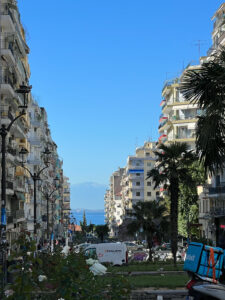
And then it was time to head to Athens. We took a morning train, and I prepared myself not to expect too much. But either Athens has changed since all those people wrote only negative things about it, or they must have seen something very different than what I saw. What I found in Athens was one of the most vibrant cities I’ve ever visited. We stayed in City Circus Hostel, and the first thing I did after arriving was head up to the roof for my first glimpse of the Parthenon. The Acropolis is stunning. They light it up at night where it sits on the hill, like this giant pedestal that makes the city glow, just like my 2nd grade imagining of the city told me it would. A never-ending maze of tiny streets full of restaurants, linen, souvenirs, and musicians weave out from it. There’s this youth and energy in Athens that’s enhanced by the backdrop of the ruins. It’s touristy, and it’s crowded, but it feels so very alive. Nothing about it was a disappointment.
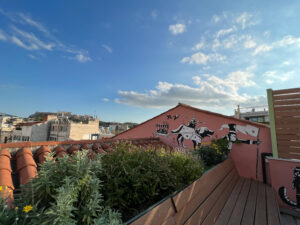
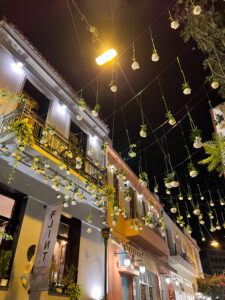
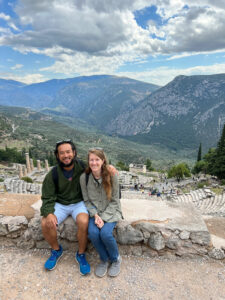
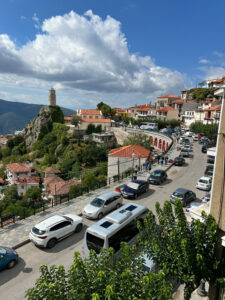
We took a day trip to Delphi one day and toured the Acropolis the next. Getting to Delphi meant another bus ride full of cliff edges and me gripping Michael’s arm as tight as I could, but it was worth my terror to see where the oracle stood. We passed a small mountain village on the way with the kind of views that I can’t fathom ever feeling normal to anyone.
It rained on us as we climbed to the Acropolis to see the Parthenon, but by the time we reached the top, the rain had stopped and given us a rainbow. The Parthenon stands at the top of the Acropolis, visible from almost anywhere in the city. It’s former temple, built in the 5th century BC and dedicated to the goddess Athena. I got teary-eyed about finally seeing it in person after waiting 25 years. Another evening, we climbed to the top of a giant hill to watch the sunset, and I felt so proud of us for finding this little-known spot that the masses hadn’t yet discovered. (I found out later that my little-known hilltop was, in fact, the place where Paul preached to the Athenians and that it was later used for public trials and is now in every guidebook and recommendation list, so we were only 2,000 years behind on the discovery.)
The lesson learned here is that managing expectations it important, but also don’t let other peoples’ opinions influence your own. Don’t skip Thessaloniki, absolutely go to Athens, and bring lactose pills from home so you don’t have to ask for them in 6 different pharmacies through Google translate.
